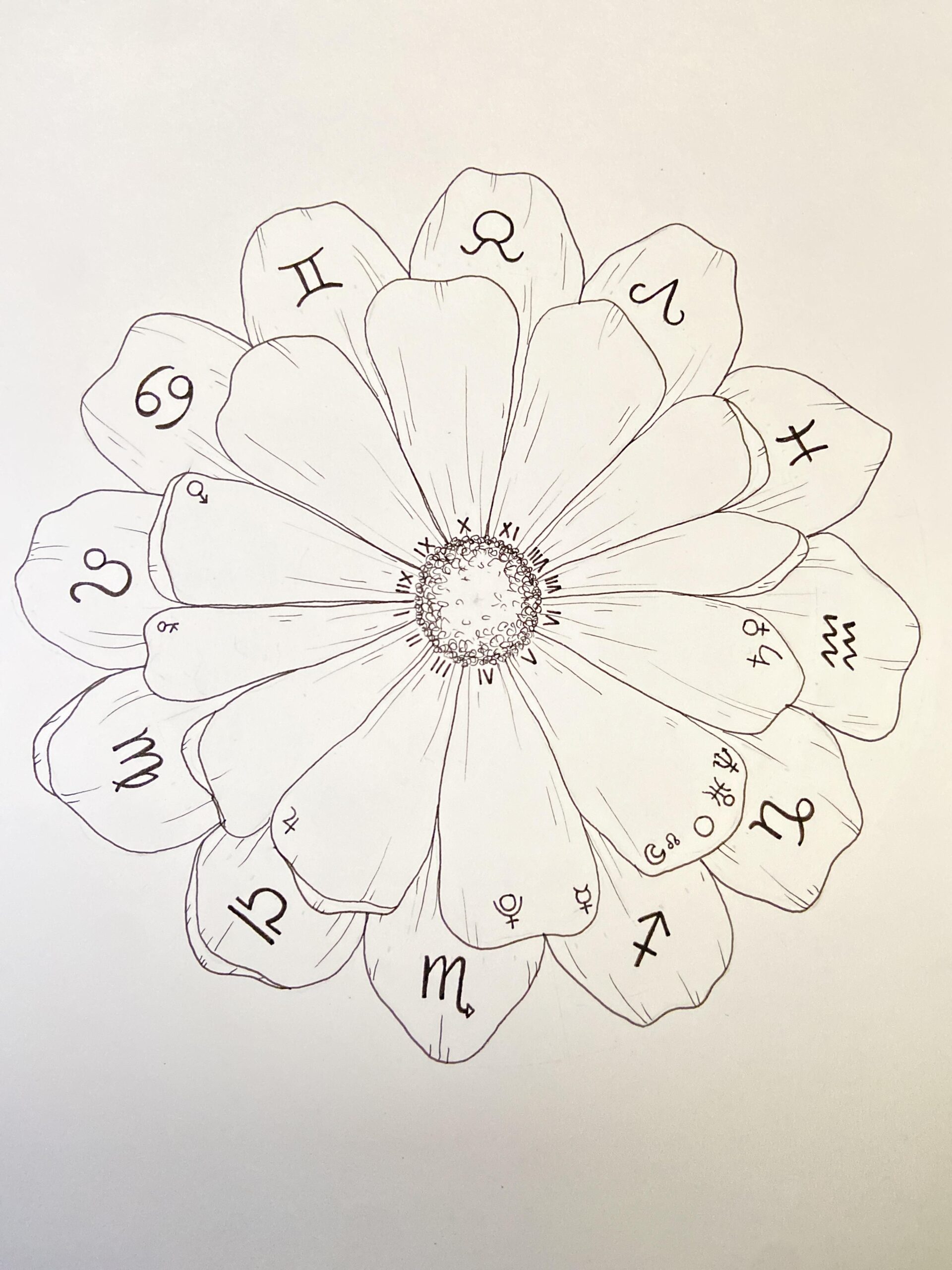
Pluto in the 3rd House: Brutal Honesty
 When Pluto is in the 3rd house, you’ve been handed a spade instead of a pen and told, “Dig deeper, there’s more beneath the surface.” This placement gives you with an unrelenting urge to unravel life’s mysteries. You don’t skim the pages of existence; you dissect them, page by page, with the intensity of a detective unraveling a conspiracy. Conversations? For you, they’re rarely casual banter; they’re opportunities to plunge into the unspoken, to pry open the lid of Pandora’s box. It’s not enough to know what someone is saying—you need to uncover why they’re saying it, the subtext, the secrets tucked between their syllables. Your thirst for knowledge is less a gentle sip and more an unquenchable gulp. You delve into psychology, and even the shadows within yourself. Superficiality? It’s a bore to you, an affront to the richness of what could be known. You have a compulsion to transform through understanding, to emerge from each deep dive into a topic as a phoenix rises from ashes: renewed, enlightened, and ready to share your discoveries with the world.
When Pluto is in the 3rd house, you’ve been handed a spade instead of a pen and told, “Dig deeper, there’s more beneath the surface.” This placement gives you with an unrelenting urge to unravel life’s mysteries. You don’t skim the pages of existence; you dissect them, page by page, with the intensity of a detective unraveling a conspiracy. Conversations? For you, they’re rarely casual banter; they’re opportunities to plunge into the unspoken, to pry open the lid of Pandora’s box. It’s not enough to know what someone is saying—you need to uncover why they’re saying it, the subtext, the secrets tucked between their syllables. Your thirst for knowledge is less a gentle sip and more an unquenchable gulp. You delve into psychology, and even the shadows within yourself. Superficiality? It’s a bore to you, an affront to the richness of what could be known. You have a compulsion to transform through understanding, to emerge from each deep dive into a topic as a phoenix rises from ashes: renewed, enlightened, and ready to share your discoveries with the world.
However, while you’re busy unraveling the mysteries of existence, you may unintentionally leave others reeling in the wake of your intensity. Not everyone is ready for conversations that feel like verbal archaeological digs. They might be clinging to the comfort of the surface while you’re already halfway to Atlantis. Your mental abilities, though, are undeniable: you are a transformer of minds, a revealer of truths. Through your words, others may find themselves unearthing hidden parts of their own psyche. You can turn mundane topics into gateways to self-discovery and inspire others to see life as the interconnected mystery it truly is.
X-Ray Vision for the Truth
With Pluto lounging in your 3rd house, you’ve got the equivalent of X-ray vision for the truth. Where others see walls, you see the cracks. Where others hear chatter, you detect the whisper of hidden motives. You’re a bloodhound on the scent of life’s untold stories, unable to rest until every corner is illuminated, every secret unwrapped. When tackling puzzles; you deconstruct them, analyze each piece, and then reassemble them in ways that no one thought possible. Challenges are your bread and butter—especially the knotty, tangled, “where-do-we-even-begin” kind that send others running for the hills.
Your curiosity is a magnetic force. You don’t dabble or skim—when a subject piques your interest, you dive in like a deep-sea diver on a mission to retrieve buried treasure. This trait makes you invaluable in roles requiring examination, investigation, or innovation. Whether it’s solving a long-standing mystery, analyzing a mountain of data, or probing into the psychology of human behavior, you have the stamina and the insight to emerge victorious where others falter.
Yet, your strength can also be your Achilles’ heel. Your relentless pursuit of understanding might occasionally leave you tangled in the web of your own making. Some mysteries aren’t meant to be solved, and some truths, once uncovered, can feel heavy. You may need to tell yourself that it’s okay to step back, breathe, and let the world hold onto a few of its secrets.
Digging Too Deep
You have a talent for unearthing truth, yet you’re occasionally cursed with the side effects of digging a little too deep. With Pluto as your co-pilot in the 3rd house, when you ask question, it’s as if you’re performing an autopsy on reality itself. And not everyone shares your enthusiasm for existential surgery. Some people would rather their secrets stay snug under a warm blanket of ignorance, thank you very much. Your ability to ask the right questions is a natural gift. It’s a strength that can unlock doors, shift paradigms, and even bring people closer to understanding themselves. You cut through the fog like a laser beam, illuminating the misunderstandings and half-truths. Yet, to the unprepared, your light can feel more like an interrogation lamp. It’s not that people don’t want to open up—it’s just that your intensity can feel like being thrust into a therapy session they didn’t book.
Now, while you’re comfortable wielding the magnifying glass, the moment someone flips it onto you, it feels intrusive. After all, you’ve worked hard to keep your own layers neatly folded, haven’t you? Some might see this as hypocrisy—but it’s simply that your probing nature often feels like a duty, a mission. But when it’s turned back on you, it’s easy to feel exposed or misunderstood, as if others haven’t earned the right to see what lies beneath your surface.
The Powerful Mind
Your mind is a powerhouse, finely tuned and relentless. When a topic grabs your attention, it’s not content to flirt with your intellect; it seduces your soul, drawing you into a black hole of questions and possibilities. When you seek to understand something; you aim to master it, to pick it apart until you hold its very essence in your hands. It’s a passion that makes you magnetic in conversations and an unparalleled force in research, problem-solving, or any field where depth and determination are required.
But with this comes the shadow of Pluto, the obsessive edge that can tip curiosity into compulsion. Your hunger for knowledge is boundless, but even boundless energy needs a place to rest. An all-consuming drive can lead to mental exhaustion or, worse, a sense of isolation. After all, not everyone is prepared to go diving into the intellectual depths with you—they might prefer a paddle in the shallow end while you’re ready to dive to the ocean floor. And then there’s the transformative act of Pluto itself. It’s easy to gather knowledge for the sake of it; but you want evolution. Every subject you study, every question you unravel, serves as a mirror reflecting your own growth. As you learn about the world—you’re reshaping your inner landscape, burning away the old and emerging anew with each insight.
Unraveling Life’s Great Enigmas
You’re not content with surface-level understanding. For you, every problem is a puzzle, every mystery a tantalizing riddle waiting to be solved. Literary mysteries, cryptic codes, or even the tangled web of human behavior—these are your playgrounds. While others might retreat in the face of uncertainty, you roll up your sleeves and plunge headfirst into the depths. Your natural talent for decoding patterns is like a sixth sense, and your ability to untangle complexities often leaves others in awe.
Psychology, of course, is a perfect outlet for your gifts. The human mind—with its twists, its hidden motives, its unspoken desires—offers an infinite well of intrigue. You are the archetypal explorer of the psyche, unafraid to enter into the shadowy corridors of thought and emotion. You intuitively understand that by uncovering what’s hidden, by peeling back the layers, you can transform not just your understanding of others but your own inner world as well. But with such immense capability comes the need for balance. Your fascination with the depths can sometimes make the surface seem irrelevant, yet it’s often on the surface where relationships live and breathe. Others may not always want their minds and motives scrutinized, even when your intention is pure curiosity or a desire to help. Be mindful of when to probe and when to simply sit with the beauty of what’s in front of you. And don’t forget to use your talents for your own benefit, too. The ability to decode and analyze isn’t only for solving external problems—it’s a tool for self-discovery. Turn that penetrating gaze inward from time to time, and you may find that the greatest mystery of all is the one that lives within you.
Dark Taboos
You’re not here for the glossy highlights or the Instagram-filtered truths. You’re the intrepid explorer who prefers to dive headlong into the shadows, where life is unapologetically real. You may have a fascination with the occult and the esoteric. The world of the hidden, the sensitive, and the forbidden doesn’t scare you—it invigorates you. You were born with a compass that always points toward the unknown, the uncharted, and sometimes the uncomfortable. Where others see darkness, you see opportunity: to learn, to grow, to transform. Whether it’s uncovering life’s secrets, diving into the depths of the human psyche, or even wrestling with existential questions, you thrive in these shadowy realms.
And your obsessive determination is nothing short of legendary. When a challenge arises, it’s not enough for you to tackle it—you have to inhabit it. Your thoughts fixate, your focus narrows, and you become a force to be reckoned with. You’ll follow the threads of a problem wherever they lead, no matter how obscure, until you’ve unraveled it completely. It’s this tenacity that makes you such a problem-solver and researcher.
You have to be careful because while your unrelenting focus can lead to unparalleled breakthroughs, it can also become a trap if you’re not vigilant. Obsession, after all, can be exhausting—for both you and those around you. Not every problem needs to be solved, and not every mystery demands an answer. Sometimes, the greatest wisdom lies in knowing when to let go. Your deep dives into taboo and sensitive topics may also put you at odds with those who prefer to keep such things locked away. You have a knack for holding up a mirror to truths others would rather not face, and while this can be transformative, it can also make people uncomfortable.
Turning Words into Potions
When you have Pluto in the 3rd house, you’re a verbal alchemist, turning words into potions capable of transformation, persuasion, and the occasional spark of revolution. With Pluto wielding its enigmatic power over your communication style, you possess a voice that resonates far beyond the words themselves. When you speak—you channel, you evoke, you leave people thinking long after the conversation has ended. Your words are laced with intensity, and even in casual conversation, there’s an undeniable depth to what you say. You invite others into a profound exchange, one that has the power to shift perspectives or stir emotions they didn’t even know were there. People feel what you have to say. It’s the kind of presence that turns heads, commands attention, and leaves a lasting mark.
And then there’s your ability for persuasion. You could never be superficially charming or even a salesman, but you do have an ability to tap into the unspoken fears, desires, and motivations of others, which gives your words a magnetic quality. When you make a point—you connect it to something real, something undeniable. Your manner of speech is wielded like a scalpel, cutting straight to the heart of the matter and leaving no room for pretense.
But the intensity of your communication can sometimes overwhelm those who prefer lighter, more surface-level interactions. Not everyone is ready for the depth you bring, and some may feel unprepared or even defensive when faced with the transformative force of your words. Balance, dear wordsmith, is your challenge here. Learning to gauge your audience and adjust your tone accordingly will allow you to make an impact without inadvertently intimidating or alienating others. Another shadow to watch for is the temptation to use this power manipulatively. When you’re capable of influencing others, there’s a fine line between inspiring transformation and pulling strings from behind the curtain. Your integrity—your commitment to truth and the greater good—will be your guide in this terrain.
A Natural Born Troubleshooter
You’re a natural-born troubleshooter with a knack for cutting straight to the marrow of any issue. You’re the person who marches right past the fluff, the superficial chatter, and the glossed-over details, ready to confront what others would rather avoid. Some people may think this is because you like the uncomfortable truths, but you recognize them as the doorway to real transformation. Your conversations are never trivial. You’re the one who takes a “How are you?” and transforms it into a deep exploration of someone’s soul. This ability to go beyond the obvious allows you to address the root causes of problems, not just the symptoms. It’s what makes you an invaluable ally in moments of crisis or confusion. Where others might falter, unsure of where to begin, you instinctively know how to get at the crux of the matter and shine a light on what truly needs to be addressed.
Your words are a tool for change, and not just in the small sense of resolving immediate issues. When you speak, you shift things. You offer insights that challenge perspectives, solutions that inspire growth, and truths that might sting but ultimately heal. t’s a rare and potent power, and it makes you a catalyst for change in every sphere of your life, from personal relationships to professional endeavors.
However, let’s not gloss over the challenges that come with this placement. Not everyone is ready for the level of depth and honesty you bring. Some may find your approach intense or even invasive, particularly if they’re not prepared to face the truths you uncover. At times, it may seem as if your insights are unwelcome, but timing and delivery are crucial. Learning to gauge when to push forward and when to let things unfold naturally will help you avoid alienating those who might benefit most from your guidance.
There’s also a shadow side to your intensity, a tendency to focus so much on uncovering truths that you risk becoming consumed by the need to fix, solve, or transform. You need to remember to give your mind a rest, not every situation is yours to heal, and not every problem demands your intervention. Sometimes, simply holding space and allowing things to be can be the most powerful contribution you can make.
Debating Pluto
You have a love of intellectual duels. A debate with you is no casual exchange—it’s a battle of wits, and you come armed to the teeth. Snark and sharp retorts are part of your arsenal, tools you wield with power. This can be thrilling to those who enjoy a good mental sparring match but intimidating or even alienating to those who prefer gentler exchanges. Unlike you, not everyone sees debate as an invitation to grow; some see it as a challenge they didn’t sign up for.
Your heightened sensitivity to your environment gives you the ability to read situations, sense unspoken tensions, and anticipate challenges before they arise. This survivalist instinct can make you remarkably capable of surviving even the trickiest of local environments. Yet, when this hyper-awareness tips into paranoia, it can color your worldview, leaving you seeing threats where there might only be shadows. It’s a slippery slope, but one that can be managed with intention. Striking a balance requires grounding yourself in the present moment and consciously choosing not to let fear dictate your interactions with the world. While vigilance is wise, it’s vital to remember that most people and places are not out to harm you. Try to promote inner peace—even a daily walk to reconnect with others around you—you can keep this heightened awareness from becoming a source of unnecessary anxiety.
You also have a deeper layer to this fear. The psychological scars you may carry from past experiences may still affect you. Childhood trauma, especially, can leave an indelible mark, shaping how you communicate and relate to others. If you’ve faced betrayal, loss of a sibling, verbal abuse, or even isolation in your early years, it’s natural to retreat into your own world as a form of protection. Solitude, in such cases, can feel safer than connection. But while isolation may provide temporary refuge, it cannot replace the healing power of authentic connection. Your wounds may have made you wary of trust and stripped away some of that childlike wonder, but they’ve also given you a depth of understanding and compassion. You know what it means to feel pain, and that awareness is the very thing that can help you rebuild bridges to others.
Nobody is telling you to throw open the gates and trusting blindly—but you could try to even find small moments where you can let someone in, even if just a little. Start with people who have proven themselves trustworthy, and let the process unfold gradually. Over time, you may find that the very connections you once feared can become sources of healing and growth.
Pluto’s presence in your 3rd house also offers an opportunity for transformation through communication. Writing, journaling, or even speaking openly about your experiences can be incredibly cathartic. By giving voice to the parts of yourself that feel isolated or scarred, you not only lighten your own burden but also inspire others to confront and heal their own shadows.
Words Have Power
Your words are never trivial; they are tools, weapons, and vessels for your inner world. Yet this intensity, beautiful as it is, can sometimes create challenges in your interactions with others. t times, a tendency to dominate conversations storms within you. When the dam of your inner thoughts bursts, the words pour out in a torrent. In these moments, you may feel compelled to control the dialogue, to ensure that your voice is heard and that the truth, as you see it, is laid bare. While this can make you an impactful and unforgettable communicator, it can also leave others feeling overwhelmed, silenced, or unable to contribute.
Then there’s the other side of the coin: those silent, introspective phases when your internal world feels too vast, too dark to be translated into words. In these moments, your silence is a recalibration—a time to process, to sort through the complicated emotions and thoughts swirling within you. These quiet periods are essential, offering you the space to reconnect with yourself and recharge from the intensity of external expression. What you may not realize is that both your verbose and reticent phases are expressions of the same need: to balance the enormity of your inner world with the reality of the outer one. When words become a release valve for your internal pressure, they can be cathartic for you, but they might not always land gently with others. Similarly, when you retreat into silence, it can leave those around you wondering what’s happening behind the scenes of your enigmatic mind.
Mental Abuse
If you faced psychological stress or bullying during your school years, it’s no surprise that your communication style bears the imprint of those experiences. The sharp edge of words, whether wielded against you or by you, became painfully clear. You likely learned early on that language could be a weapon, a shield, or even a lifeline. These lessons, though difficult, may have given you an acute awareness of the power of speech and the vulnerability it can expose.
The trials you endured didn’t break you; they became the soil from which your empathy and wisdom now bloom. You understand what it feels like to be silenced, misunderstood, or hurt by words, and this understanding fuels a drive to use your own voice for good. Whether by offering support, guidance, or simply being a safe space for others, you’ve harnessed your early pain into a powerful tool for empowerment.
Your oscillation between talkative and silent phases is part of this early background. The talkative side of you emerges when you seek release, when you want to share, connect, and make an impact. The silent side, however, holds a different kind of power—it’s where your depth resides, where you observe, analyze, and absorb the undercurrents of what’s being left unsaid.
Your keen psychological insight is another gift of Pluto in the 3rd house. You feel the weight of words, sense their implications, and read between the lines to uncover what’s truly being communicated. This makes you an exceptional listener and advisor, someone who can gently probe into the heart of a matter and offer insights others might not have seen. It’s a talent that’s deeply valuable, especially in a world that often skims the surface. However, you can engage in light banter when the occasion calls for it, but your true strength lies in your ability to delve into the human mind. You’re not afraid to explore taboo topics because you know that real growth and understanding often come from facing the uncomfortable. People are drawn to this intensity, even if it occasionally feels overwhelming. They sense that when they talk to you, you’re really engaging in what they have to say.
Crossing Boundaries
When talking with others, you may have had moments of oversharing or overstepping, it is a symptom of your intensity. You’re not content with the shallow waters of superficial conversation; you dive headlong into the depths. When you speak with unrestrained honesty, it can feel like you’ve opened a window to your soul while others are still deciding whether to crack the blinds. If your communication patterns were shaped by a past mental breakdown or crisis, it’s likely that this pivotal experience shattered your previous worldview and forced you to rebuild from the ground up. This kind of transformation, while difficult, has given you an extraordinary gift: the ability to see through the illusions and platitudes that many cling to.
You have a tendency to push boundaries in conversation. Ideally, you seek meaningful dialogue rather than pushing a talk beyond its natural boundaries. Your honesty can strain relationships or leave you feeling isolated if others perceive your intensity as confrontational or intrusive. Timing, tone, and an awareness of your audience’s comfort level can make all the difference between creating connection and causing discomfort. It’s also worth acknowledging that your intense verbosity can sometimes be a coping mechanism. When the inner storm of thoughts and emotions becomes too overwhelming, speaking or sharing might feel like a release valve. Conversely, your aversion to superficiality might stem from a fear of returning to the “old you”—the one who may have felt silenced, misunderstood, or unworthy before the transformation. Balancing these tendencies means finding ways to honor your depth without letting it consume every interaction.
If you actually use the written or spoken word to convey your deeper feelings, your writings will be aimed at altering the very way in which we look at life. In short, in one way or another, you aim to introduce a more profound intellectual tone to your surroundings.The Instant Astrologer
Pluto at School
In the realm of education (3rd house), Pluto’s shadow may have loomed large. For you, school might not have been a place of carefree learning but a battlefield of survival. Bullying, feelings of ostracism, or even a singular tragic event could have left an indelible mark. You may have felt unseen by teachers, misunderstood by peers, or even wary of the educational system. Perhaps school was where you first encountered power dynamics, exclusion, or the sometimes cruel, social hierarchies of childhood.
And then your relationship with siblings —a potent field of influence for the 3rd house. Pluto here suggests that your relationships with them may have been intense, transformative, and occasionally fraught. If you had a dominant or abusive sibling, you may have grown up with a heightened sense of vigilance, learning to read every shift in tone or body language as a survival mechanism. Alternatively, if you were the protector, you may have felt the weight of responsibility early on, guarding your siblings like a watchful sentinel, a role that could carry into your adult relationships.
Competition may also have been a theme, especially if a sibling struggled emotionally or behaved combatively. Rivalries are not confined to who got the last slice of cake; they may have been deeper, involving feelings of worthiness, attention, or identity. Yet, for all the potential conflict, Pluto’s influence in the 3rd house also holds the potential for healing wounds. A sibling relationship marked by mutual understanding and emotional depth could become a source of great strength—a bond unlike any other, one that shapes you both in extraordinary ways.
These experiences, while challenging, have gifted you with a finely tuned awareness of power, vulnerability, and emotional depth. They may have made you more guarded in your communication—careful about what you reveal and to whom. Or, conversely, they may have inspired a more assertive approach, where you take control of conversations to avoid feeling dismissed or silenced. Both patterns are ways of managing the intensity you’ve carried from those early years.
The very experiences that may have hurt or alienated you can become sources of growth. Your past difficulties with school may now fuel a love of learning on your own terms—digging deep into topics that interest you, free from the constraints of traditional education. Similarly, the intensity of your sibling dynamics might inspire you to build relationships founded on trust, empathy, and authenticity, whether with siblings or others.
Words into Spells
Pluto in the 3rd house is a placement that turns words into spells. Your communication can shape reality itself. With Pluto’s influence, you possess an awareness of the impact of words, and this can make your speech both a weapon and a tool for healing.
You have a natural tendency to withhold information, which is an instinct born of experience. Perhaps there was a moment in your early years when knowledge, freely shared, came with unintended consequences. Maybe a secret you revealed spiraled out of your control, or perhaps the truths you uncovered were too heavy for the world around you to bear. Such moments can leave a deep impression, teaching you to tread carefully in the realm of communication. This may have also made you paranoid. Your words are potent. With this placement, you’ve been granted a secret pact with the forces of manifestation. Even casual remarks, spoken in jest or frustration, can seem to ripple outward and take on a life of their own.
This peculiar phenomenon might initially feel unnerving, but it could be due to intensity of your focus and intent. Whether you realize it or not, your words carry the weight of your inner power, and they resonate deeply with those who hear them. You’ve learned, perhaps through trial and error, that words can heal, harm, inspire, or unravel. You understand their ability to influence perceptions and outcomes, and this awareness makes you an exceptional communicator when you choose to step into that role. Whether it’s through writing, speaking, or even subtle nonverbal cues, you have a knack for delivering messages that strike at the core of what matters.
Of course, your intense awareness can also make you cautious—or even reluctant—to share too much. There’s a fine line between thoughtful communication and self-censorship, and finding the balance between the two is one of your lifelong lessons. While your discretion is a strength, it’s important to remember that vulnerability and openness, when offered to the right people, can deepen your connections and enrich your relationships.
Neighborly Shadows
Pluto in the 3rd house casta its shadow over the neighborly dynamics of your world. It’s a fascinating, if occasionally fraught, arrangement. The mundane interactions of day-to-day life are infused with an intensity they don’t quite warrant, where casual waves and pleasantries can feel charged with unspoken undercurrents. You often have a suspicion of neighbors or close acquaintances, and it is understandable, given Pluto’s tendency to magnify and probe beneath the surface of everything it touches. You may feel as though others are prying, meddling, or harboring hidden motives, even when their intentions are innocent. This heightened awareness could be paranoia in the traditional sense—it’s could also be your Plutonian radar, always tuned to detect what’s lurking in the shadows. But like any finely tuned instrument, it can pick up interference, and sometimes the static of your own fears might distort what’s truly there.
You might instinctively sense control games or subtle manipulations in everyday encounters, even if they aren’t consciously intended. This can make seemingly minor conflicts feel like battles for territory, privacy, or respect. Your strong desire for boundaries and control over your personal space means that any perceived intrusion, however small, can trigger a powerful response. Nosiness or over-familiarity from others is particularly irksome to you, as it feels like a direct affront to the sovereignty you hold so dear.
But let’s take a step back, my Plutonian observer. Not every glance out the window or overly chatty neighbor is a plot to breach your defenses. Sometimes, people are simply being themselves—unfiltered, imperfect, and unaware of the intensity with which you experience the world. You have to learn how to distinguish between genuine threats to your boundaries and projections of your own inner fears or past wounds. Ask yourself: Is this person truly overstepping, or am I reacting to a deeper need for control and safety? Your strong desire for privacy is valid and should be honored, but it doesn’t have to lead to isolation or unnecessary conflict. You have the power to create relationships that feel safe and respectful, even in your immediate environment. Sometimes, a simple, firm statement like, “I prefer to keep my personal matters private,” can establish the boundary you crave without escalating tension.
The Toll of Suspicion
The toll of suspicion and overthinking is real. Your inner Plutonian lens, so adept at uncovering truths, sometimes becomes too finely tuned, picking up signals that may not exist. This hyperawareness, while a strength in certain contexts, can lead to mental exhaustion or a feeling of being perpetually on edge. It’s not uncommon for those with this placement to feel as though they’re carrying the weight of every interaction, replaying conversations, or overanalyzing the intentions of others.
Your serious approach to communication is one of your greatest strengths. Whether you’re discussing the mundane or the profound, you bring a gravity to the conversation that makes people sit up and take notice. You need to be heard, but not for validation—you want to leave an impact. Superficial chit-chat rarely satisfies you; instead, you steer the discussion toward the heart of the matter, uncovering truths that others might not even realize they were hiding. It’s a skill that makes you magnetic, unforgettable, and sometimes intimidating.
Your brutal honesty is, without a doubt, one of your defining traits. It’s part of what makes you unforgettable. You don’t speak; you pierce. Whether intentionally or not, your words have a way of finding the unguarded places in others. People do respect your candor and insight. When you speak, it feels as though you’re peeling back the layers to reveal truths that others might not even admit to themselves. You have a knack for cutting through pretense and addressing the heart of a matter. This ability makes you invaluable in roles where depth and emotional intelligence are required. Counseling, leadership, or any field that requires the art of persuasion is your domain, where your words can heal, inspire, and guide others toward transformation.
But with great power comes great responsibility. Your awareness of people’s inner workings—their fears, vulnerabilities, and motivations—means you also hold the keys to their tenderest spots. At times, you might wield this knowledge like a dagger, intentionally or not. A comment made in frustration or a jab thrown in a moment of defensiveness can land like a sucker punch, leaving the other person reeling. Your ability to see others so clearly means you know exactly where to aim, even if you didn’t mean to strike. This pattern can stem from a combination of factors. Perhaps it’s a defense mechanism, a way of asserting control in situations where you feel threatened or vulnerable. Or maybe it’s simply the byproduct of your deep intensity—your words, like your thoughts, don’t tend to skim the surface.
Here’s the thing: words, once spoken, can’t be taken back. While your insights might be true, not every truth needs to be spoken bluntly. Be mindful of the emotional state of the other person, which can help you avoid unintentionally wounding those you care about. Brutal honesty, when i comes form a place of compassion, becomes constructive honesty—a force that uplifts rather than cuts. It might help to pause before speaking and ask yourself: What is my goal here? If it’s to help, consider whether your delivery matches your intention. If it’s to defend or assert yourself, explore whether the response is proportional or driven by deeper fears or frustrations. These moments of reflection can help you channel your intensity in ways that build trust and connection rather than leaving scars.
So, speak with the intention to illuminate, not to injure. And trust that your depth and candor, when balanced with kindness, will make your voice a force for transformation and connection, not just power. After all, your ability to see into the soul of a situation is rare, and the world is better for it—but only if it feels safe enough to listen.



















 Venus-Pluto Synastry: A Love So Powerful That It Might Just Kill Them
Venus-Pluto Synastry: A Love So Powerful That It Might Just Kill Them
 Venus-Pluto Aspects: Ruin Me
Venus-Pluto Aspects: Ruin Me
 Sun Square Pluto Synastry: You’ve Got That Power Over Me
Sun Square Pluto Synastry: You’ve Got That Power Over Me
 The Difference: Progressions Vs Transits
The Difference: Progressions Vs Transits
 Moon Conjunct Pluto Synastry
Moon Conjunct Pluto Synastry
 The Twin Journeys of Saturn’s Returns
The Twin Journeys of Saturn’s Returns
 Mars in Aquarius: Sex drive
Mars in Aquarius: Sex drive
 Mars-Pluto Synastry: Something Quite Dark and Dangerous
Mars-Pluto Synastry: Something Quite Dark and Dangerous
 Mars Square Pluto Natal Aspect: The Unbreakable Spirit
Mars Square Pluto Natal Aspect: The Unbreakable Spirit
 Venus Trine Pluto: Dark Desires
Venus Trine Pluto: Dark Desires
 Uranus Transits the 6th House
Uranus Transits the 6th House
 Emotional Understanding: Moon Trine Synastry Aspects Interpreted
Emotional Understanding: Moon Trine Synastry Aspects Interpreted
 Reflections on a Past Venus-Pluto Synastry Aspect
Reflections on a Past Venus-Pluto Synastry Aspect
 Sun Opposite Pluto Natal Aspect
Sun Opposite Pluto Natal Aspect
 Pluto in the 8th House: Secrets of the Soul
Pluto in the 8th House: Secrets of the Soul
 Venus Trine Mars Synastry
Venus Trine Mars Synastry
 Uranus Transits 8th the House: Rebirth from Chaos
Uranus Transits 8th the House: Rebirth from Chaos
 Mars Conjunct Pluto Natal Aspect: From Ember to Inferno
Mars Conjunct Pluto Natal Aspect: From Ember to Inferno
 Transiting Pluto Aspect Natal Mars: Are You Mad as Hell
Transiting Pluto Aspect Natal Mars: Are You Mad as Hell
 Mercury Square Pluto Natal Aspect
Mercury Square Pluto Natal Aspect